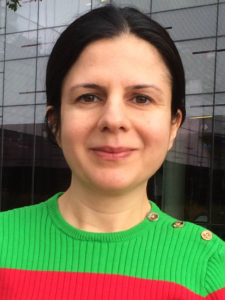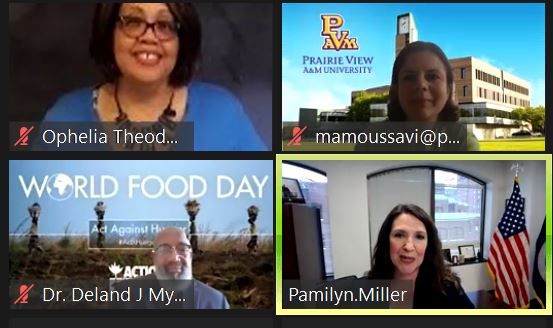By: Kerry Liard
October 27 – On Friday, October 16, Prairie View A&M University and the College of Agriculture and Human Sciences (CAHS) hosted World Food Day 2020, an annual event commemorating the founding of the Food and Agriculture Organization of the United Nations. Nearly 250 attendees registered for this year’s celebration. The event featured six presenters and four breakout sessions, with keynote speaker K.D. Kokate, Ph.D., participating via Zoom from India.
Gerard D’Souza, Ph.D., College of Agriculture and Human Sciences Dean and Director of Land Grant Programs, opened World Food Day 2020 by acknowledging the “historic” nature of the event, which was held virtually for the first time ever as a result of the pandemic.
“It has brought us closer to other parts of the globe to address hunger locally, but also globally,” said D’Souza, calling on the Zulu word for ‘synergy’—bombIsanani—to underscore that the work to end hunger “must be done together.”
D’Souza discussed how the CAHS is leading the way in agricultural innovation and community distribution by presenting the world with a model for farm-to-fork implementation through various food security initiatives on campus, naming CAHS as “the only comprehensive agricultural college” in the greater Houston area.
“We are moving from the Green Revolution to the so-called gene revolution,” said D’Souza. With CRISPR gene-editing technology now present on campus, D’Souza said educators and students are leading the way to research, discovery and dissemination for the more precise agricultural practices of the future that can be used to end hunger.
World Food Day 2020 presenters addressed many of the challenges that result in food security and agricultural sustainability issues faced around the globe. Not surprisingly, the effects of COVID-19 on food production and distribution dominated the conversation.
“Due to the current COVID-19 pandemic, the main focus of this year’s World Food Day event was on adverse effects of the pandemic on food and nutrition and how to respond to it, as well as recovery plans during and post-pandemic,” said World Food Day 2020 Committee Chairperson Mahta Moussavi, Ph.D., CAHS food systems researcher.
COVID-19 has reshaped the world’s food production and distribution capabilities, critically hampering food access to billions of people. However, the current pandemic crisis has only added to the world’s food shortages, which were already under siege from the looming threat of climate change, stated several of the presenters.
“This current crisis is one which we were not prepared for,” said Kokate, former deputy director general, Agricultural Extension, for the Indian Council of Agricultural Research. Speaking from India, Kokate said, “The number of people in extreme poverty will increase, and this makes the current food crisis” an even bigger challenge. “You can’t have peace without food security,” he added. Parenthetically, it is no coincidence that the 2020 Nobel Peace Prize was awarded to the United Nations World Food Program.
Kokate illustrated through a graphic that 30 percent of worldwide crop production will be at risk by 2025 due to water shortages. However, the changes in climate and population patterns are affecting the world disproportionately. While hunger is currently a severe problem for some 250 million people in Africa, that number is expected to jump to 433 million by 2030, while populations in areas like south Asia are expected to experience a decline in hunger.
“Recent climate changes have had life-changing impacts…on food systems,” said Kokate, with 57 percent of Sub-Saharan African and south Asian populations unable to access a healthy diet. He added that the climate change impact on food security has put China “on the brink of major food shortages” as a result of catastrophic flooding and insect infestations.
But through innovation and initiative efforts highlighted in the University’s World Food Day event, global and local communities have been able to band together and provide much-needed sustenance for hungry populations. These accomplishments were highlighted in this year’s theme: “Grow, nourish, sustain. Together.”
Kwaku Addo, Ph.D., Associate Dean for Academic Programs and Department Head, said that Prairie View A&M University is “preparing the next generation of agricultural scientists” by “expanding the curricula to address new and developing issues involving agricultural sustainability and food security.” He said the university is accomplishing this by using GPS-driven data to improve crop sustainability and develop innovative technologies that will help better manage resource systems and solve environmental problems. Addo said the successful implementation of such initiatives will occur through engagement in community-based learning.
USDA Agricultural Liaison Horace Hodge, who also participated in the virtual conference, echoed the need for community involvement.
“This was a snapshot, primarily for our agriculture students, into food production and the impact the lack of food can have on any one person in society,” said Hodge. “It has been these community-based organizations that have played a really important role in getting the food out to the people. The USDA stood ready to bring positive action during the pandemic and respond in a way that has really been pretty efficient in mitigating hunger.”
Hodge said that USDA Deputy Administrator of Commodity Procurement David Tuckwiller served as the “ideology guru” behind the Farmers to Families Food Box Program, an effort that led to the distribution of 30,000 healthy food boxes to the Prairie View, TX, community—with more than 106 million food boxes distributed across the country.
In April 2020, dairy farmers, ranchers, and produce farmers were forced to dispose of large unused portions of dairy products, destroy fresh produce and euthanize animals when food surpluses mounted because businesses like restaurants, schools, and sports stadiums, who purchase food in bulk, were no longer in need of the supplies since they had shut down for an extended period of time. Tuckwiller saw an opportunity to help reorganize the infrastructure and redistribute the food to hungry, underserved populations across the country.
“Market support was the focus,” said Tuckwiller, who presented at Friday’s World Food Day conference. “How do we support the fresh produce market? We expanded to support any nonprofit organization across the country that illustrated a need. The response was absolutely overwhelming, which was a clear indication of the need out there.”
In the end, Tuckwiller’s group extended their typical annual procurement from $3 billion to $8.5 billion, “all in support of the American farmer and feeding people,” he said.
Hodge said the program helped farmers, and families, by contributing to more healthy eating habits during one of the worst periods of our country’s history. “It was a win-win-win situation,” Hodge added.
The university’s event was one of many celebrated in more than 150 countries around the globe participating in World Food Day 2020, which marked the 75th anniversary of the founding of the United Nations Food and Agriculture Organization.
“We need to continue our efforts to address national and international crises by having such programs and events to help affected communities,” said Moussavi. “Also, the outcomes of such programs need to be shared with governmental bodies to improve the response and recovery plans.”
Kokate said the way forward involves the creation of a robust food value chain and healthcare system, the development of fiscal and monetary stimulus measures, initiation and strengthening of social protection programs, the prediction of future shocks and likely impacts, and the promotion of innovations and entrepreneurship.
“To manage anxiety and emotional stress, this is the time for compassion,” he said. Quoting UN Secretary General Antonio Guterres, Kokate ended with, “Together we can overcome this crisis and build inclusive and sustainable societies for all.”
 For more information about PVAMU’s World Food Day 2020 please contact:
For more information about PVAMU’s World Food Day 2020 please contact:
Mahta Moussavi, Ph.D.
Post Doctoral Research Scientist
mamoussavi@pvamu.edu

